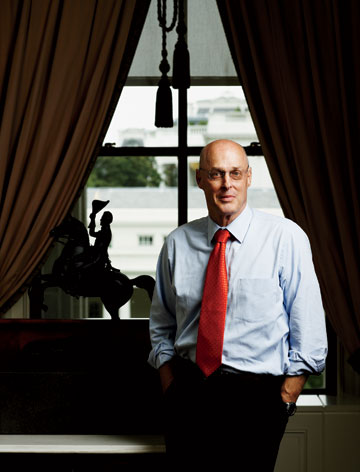Henry Paulson’s Longest Night
By Todd S. Purdum, Vanity Fair, October 2009
In 2006, Goldman Sachs C.E.O. Henry Paulson reluctantly became Treasury secretary for an unpopular, lame-duck president. History will score his decisions, but the former Dartmouth offensive lineman definitely left everything on the field. In private conversations throughout his term, as crisis followed crisis—Bear Stearns, Fannie Mae and Freddie Mac, Lehman Brothers, A.I.G., and so forth—Paulson gave the author the inside track, from the political lunacy and bailout plans to the sleepless nights and flat-out fear, as he battled the greatest economic disruption in 80 years.

Henry Paulson, then the Treasury secretary, in his office last September, the month Lehman fell and the bailout took shape. By Nigel Parry/CPi Syndication.
It was February 2008, and Henry M. Paulson Jr., a prince of Wall Street turned secretary of the Treasury, was reflecting on his biggest achievement to date: a $168 billion economic-stimulus package that had passed Congress four days earlier after swift, bipartisan prog ress through both houses. In light of all the later twists and turns that the global financial system and the national economy took, this measure would come to seem quaint and fainthearted. But at the time, it was a very big deal indeed, and Paulson felt justifiably proud. The stimulus had been his baby. Paulson had persuaded George W. Bush, whose relations with both parties in Congress were by then close to toxic, to articulate only the broadest principles, and not to present a detailed plan. Paulson himself, in endless night and weekend negotiations with congressional leaders, had delivered the final package.
“Nancy Pelosi to me was a wonder in this deal, and she was available 24-7, anytime I called her on the cell phone,” Paulson told me, his hulking frame unfolding in a comfortable chair in his office at the Treasury, dominated by an oil portrait of his first pred e ces sor, Alexander Hamilton. “She was engaged, she was decisive, and she was really willing to just get involved with all of her people on a hands-on basis.” Paulson paused. “Now let me … I’ll be there in one minute … Let me just make a … I have been, you know … I finished this thing on Thursday night, flew over to Tokyo, flew back, and I’m battling a bit of a stomach problem.”
And with that Paulson ducked into the private bathroom adjoining his office, closed the big paneled door, and audibly, violently, and repeatedly threw up. He emerged a moment later as if nothing had happened, but in a few minutes he did the same thing all over again. I asked if he wouldn’t rather stop, and resume our conversation another time. “That’s O.K.,” he said. “I’m just going to go through this all. I won’t remember it. You know, I barely remember the details now.”
In the months to come, I would think of Paulson’s perseverance in the face of gastric distress as a metaphor for the way he persevered through the worst global financial crisis since the Great Depression. He never missed a day of work due to illness or indisposition in two and a half years, though he often awoke at one or two a.m., unable to go back to sleep. “I don’t mean to make light of this, because I felt awesome responsibility,” he told me on one occasion. “But as I said to someone—it may not be a great analogy, but once you’re boiling in oil, it doesn’t make much difference” what the temperature is.
Like the Dartmouth offensive lineman he once was (his nickname had been “The Hammer”), Paulson spent most of his time at Treasury slogging down the field, facing one crisis after another. History will decide whether Paulson’s policy choices were wise or ill-advised. Economists and politicians are already deeply divided. But watching him over many months, it was hard not to be impressed by the resolve with which this moderate old-line Republican—a man with a threshold faith in the wisdom of markets—became the greatest economic interventionist of his generation.


